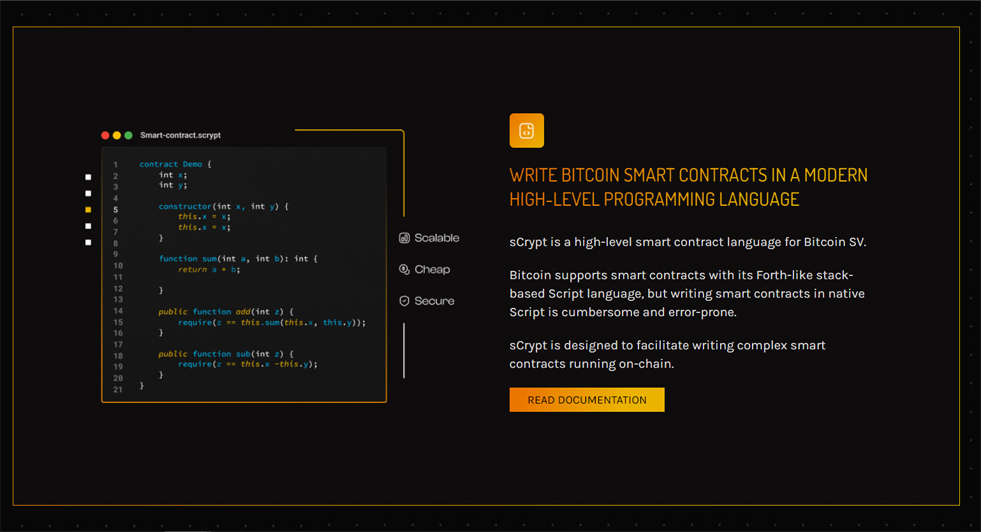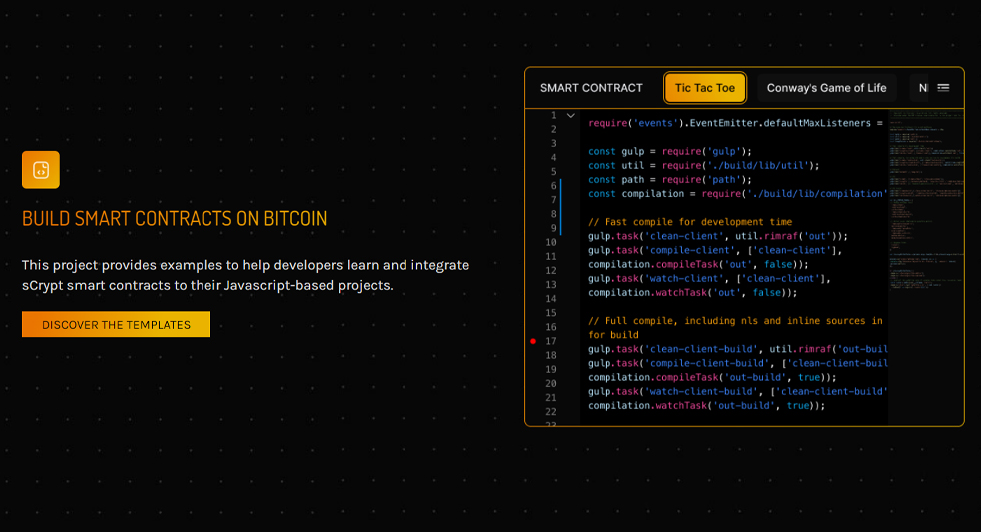
Bitcoin News
sCrypt section launch on BitcoinSV.com
Write Bitcoin smart contracts in a modern high-level programming language.
Bitcoin Association for BSV has launched an sCrypt introduction page to detail the opportunities the language offers, how to use it and how much cheaper it is to use than other smart contract languages.

By promoting sCrypt as the focus language of BSV, we expect more people to use it for its ease of use. As a result, we foresee a rapid increase in the number of smart contracts created on Bitcoin SV.
What is sCrypt?
Cryptocurrencies always have a high level language, which means it’s easy to write very complex scripts as it abstracts all the easier things into simple syntax.
sCrypt is one of these high level languages, and it’s very similar to Ethereum’s Solidity, although Solidity is not Ethereum’s base language, rather it’s opcodes. The Bitcoin Association has decided to move to sCrypt as the official language for Bitcoin SV. Although you could use different languages to get to the base opcodes or write some from scratch, the BSV Association considers sCrypt as the leader in smart contract languages and will therefore encourage people to use it to write their own smart contracts with.

Why BSV’s sCrypt instead of Ethereum’s Solidity?
While the ease of programming in sCrypt is comparable to Solidity, most businesses who coded their prototypes with Solidity watched their projects give up the ghost as soon as they tried implementing it on Ethereum.
Ethereum can only manage 14.5 transactions per second. With thousands of companies attempting to do smart contracts on the network, there was simply not enough bandwidth for their transactions. The only way to get your transactions processed on Ethereum is by paying more money than other companies to buy a guarantee that you get to the front of the line. The situation has led to a single transaction costing close to $500, with smart contracts reaching costs of $1,000. The lack of economic feasibility led to people abandoning their projects. In the end, the only smart contracts left on Ethereum were ICOs and DEFI where a single transaction can be around $100,000.
sCrypt’s unique value propositions
– You can expect around a 10,000 times price decrease compared to an Ethereum smart contract.
– sCrypt is also Turing complete, which means it can do every aspect of coding language that Ethereum can do.
– Ethereum is an account-based system where Bitcoin is a UTXO-based system. UTXO-based systems are very scalable, because every transaction is their own entity. At the same time, it’s quite different from smart contracts on account-based systems, where all your balances are automatically summarised and all interactions with smart contracts have a central identifier.
Ethereum is thus a more centralised system than BSV. By developing smart contracts with BSV we can unlock much more competitive prices. At the same time, BSV is somewhat more difficult to write for, which is where sCrypt comes in.
What can I do with sCrypt?
Smart contracts can be almost anything; it can be a DAO, it can be a voting system, it can be a fund lock-up system, or you can programme a banking app with smart contracts which gives it quite a range of possibilities.

Encouraging use of sCrypt
With BSV’s sharp focus on sCrypt, the Association is creating tools to aid its adoption, one of which is the Transpiler that’s launching soon.
The BSV Transpiler lets you convert Solidity, which Ethereum smart contracts are written in, into sCrypt language. And from sCrypt you can go into Bitcoin script and publish it to the Bitcoin SV network.
The sCrypt page will expand on the topic and give many examples of what’s already possible with sCrypt. For example, you could convert an ERC-20 or an ERC-721 directly to a Bitcoin script. Although the sCrypt.io website provides a good outline and a tutorial, we’d like to make it the central part of the Bitcoin SV community platform so those who are new to the ecosystem can find it instantaneously.



